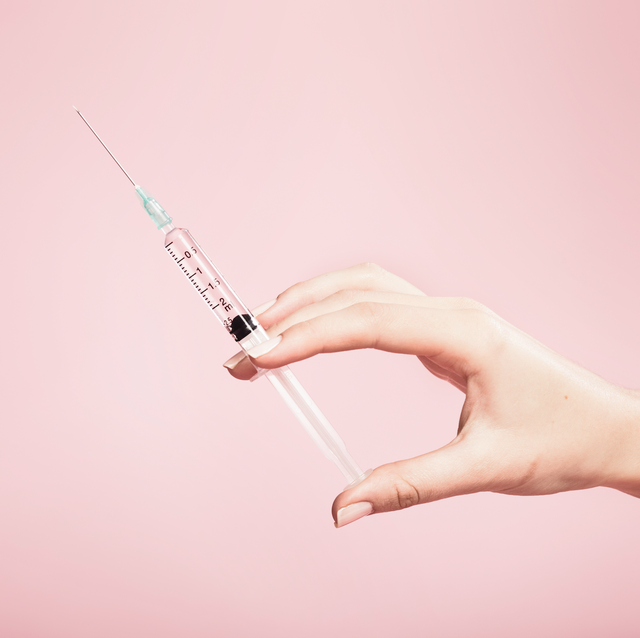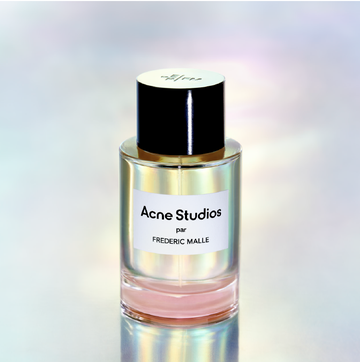If you’re feeling rundown, fatigued, or could use a major metabolism boost, there’s a simple solution that doesn’t involve pills, surgery, or a treadmill—but it’s going to sting. Celebrities like Khloe and Kim Kardashian, Chrissy Teigen, and Hailey Baldwin are hip to the benefits of vitamin shots and vitamin IV drips: quick in-office procedures that fans say boost energy, make your skin glow, and even help promote weight loss. With their lofty claims, it's easy to wonder if vitamin shots are just a placebo effect pushed through a needle, or if they can actually do some good for our tired, sluggish bodies.
Close to a decade ago, millions of TV viewers watched as Registered Nurse and Skincare Expert Nurse Jamie injected Paris Hilton and Nicole Richie with vitamin B12 right in their bums on the hit reality show The Simple Life. After that, she says injectable vitamins became one of her most popular treatments. The demand stems from the challenges a lot of us face getting enough nutrients from diet and oral supplements alone.
“Studies reveal that over 90 percent of people are deficient in at least one or more nutrients,” Nurse Jamie says, adding that the most common nutritional deficiencies are vitamins D and B12, iron, calcium, vitamins C,E, and A, fiber, and potassium. "It’s easier for our bodies to absorb liquid vitamins better than their counterpart, pills.”
But the decision to inject, ingest, or infuse vitamins is a highly debated topic. When it comes to oral supplements, she says optimal vitamin and mineral absorption depends on several factors, including the time of day you take them (most at-home vitamins can be taken with breakfast), whether you take them with food, and what form you take. Because vitamin absorption by the gut is less effective than a shot directly into muscle or vein, a higher dose is often needed when taken orally—and since your local drugstore is probably not stocking up on over-the-counter pills in extremely high doses, you might need multiple doses to make up the difference. That’s a whole lot more vitamins than most of us are probably popping with our morning green juice.
“When nutrients are injected directly into the bloodstream they bypass the digestive system and are pushed directly into cells where they can be more effectively utilized by the body,” Nurse Jamie explains. “Weekly vitamin shots are an effective way to increase your energy, strengthen your immune system, and promote weight loss.”
The specific shots you can get—or need—depends on your health practitioner, your specific health concerns, and how willing or able you are to shell out approximately $75-100 per shot.
B12 Shots
At Park Avenue Skin Solutions, Certified Physician Assistant Lauren Abramowitz, who specializes in cosmetic dermatology, says her New York City clients typically visit once a month to receive one of two popular “therapeutic injections”: a B12 shot or MIC injections. The latter is a blend of the amino acids Methionine, Inositol, and Choline, which together prevent excess fat buildup in the liver and body, support the endocrine and cardiovascular systems, and aide in the metabolism of fats. Shots are administered in the upper arm, and the effects of something like a B12 shot are immediate, perceptible, and can last about two to three weeks.
“The main shot we give is B12, which provides a boost of energy and helps with metabolism and fatigue,” Abramowitz says. “Someone comes and says, ‘I’m so tired, I have soreness in my muscle.’ Thirty minutes later they’re bouncing around the office.”
Prior to administering a shot, Abramowitz asks clients about their medical background, menstrual history, and diet (many vegetarians and those with dietary restrictions suffer from B12 deficiencies, she says). Abramowitz says she is careful to turn people away if she suspects there is more going on than just a need for B12. “If someone is chronically fatigued then I send them first to a doctor to find out the underlying issue,” Abramowitz says. “I don’t want to mask underlying issues.”
Abramowitz also notes that unlike monthly B12 shots, which studies have shown is key to optimal immune system function, the MIC injection is a shot specifically designed to be incorporated into a short-term weight loss program with other supplements.
“These are bi-weekly shots taken for three months,” she says. “People find that they’re losing weight faster — but it’s in combination with a healthy diet and working out. It just can’t be the shot.” It's important to note that very few scientific studies have proven the dramatic claims of MIC injections, although anecdotal evidence points to the fact that they can work for a relatively short period of time. As with any dietary supplement, talk to your doctor about how this shot might affect you before giving it a try.
Vitamin IV Drips
The menu at Nurse Jamie’s California office Beauty Park Spa includes B12, which she says is a hit among celebrities craving a boost before 18-hour filming days; the Metabolism Boost “Lipo Shot,” which includes three fat-burning amino acids, vitamins C, B12 and the B vitamins; and the Vitamin Complex Shot, a cocktail of vitamins C, B1, B2, B5, B6, and B12, which claims to maintain healthy nerve function and skin and eye health.
If a single vitamin shot seems like amateur hour and you want to kick your health regimen up a notch, never fear — you can follow celebs’ leads and host or attend a vitamin IV party. They're especially popular in Las Vegas, where hangovers are cured with a steady drip of cocktailed vitamins.
"Vitamin IVs have been used by celebrities and industry insiders for years. The infusion is a balanced combination of vitamins and minerals used to treat a range of ailments and increase energy," says Nurse Jamie. "The infusion consists of magnesium, calcium, vitamin B-5, vitamin B-6, vitamin B-12, vitamin B complex, and vitamin C." You only need to be hooked up to the drip for about 15 minutes to feel the results. Prices vary widely depending on where you're located, but you can expect to shell out a few hundred dollars for just a few minutes of being hooked to an IV drip.
The Risks
Of course, too much of a good thing can sometimes backfire and, as with all elective treatments, there are a few reasons to be cautious of vitamin shots. Overdose is more likely with fat soluble vitamins A, D, E and K, says Nurse Jamie. That's why it's critical to seek out a physician who is well trained—simply dosing the wrong amount could result in cardiac arrest. And if you are a diabetic whose blood sugar is not stable, Abramowitz recommends foregoing shots completely to be safe. More minor risks include infection, bruising at the injection site, and inflammation.
Dr. Tania Dempsey, a board certified internist at Armonk Integrative Medicine, says vitamin injections and IVs can be essential to patients who have vitamin deficiencies. Absorption issues can stem from surgeries like gastric bypass, inflammation in the gut, and hereditary factors. In these cases, she says oral vitamins wouldn’t have a great enough effect on their levels, so giving the vitamins intravenously or intramuscularly will bypass the gut and get the vitamins directly into the blood stream where they can then be absorbed into their cells.
Studies suggest that most Americans aren't quite as vitamin-deficient as we're led to believe, but a simple blood test can reveal what supplemental shots—if any—you should get. And while most of us reach for vitamin C when we're feeling under the weather, it's actually the vitamin most likely to cause issues in large doses.
"The risk of IV vitamin C is relatively low but the possible side effects are a complication from the IV procedure like bleeding, infiltration, burning, and irritation from the vitamin C itself," says Dempsey. "High-dose IV vitamin C can cause hemolysis or damage to red blood cells usually seen in patients who have a genetic disorder called G6PD. Screening for this before receiving IV vitamin C can minimize this risk.”













